#labor
Text
“Humans in the loop” must detect the hardest-to-spot errors, at superhuman speed
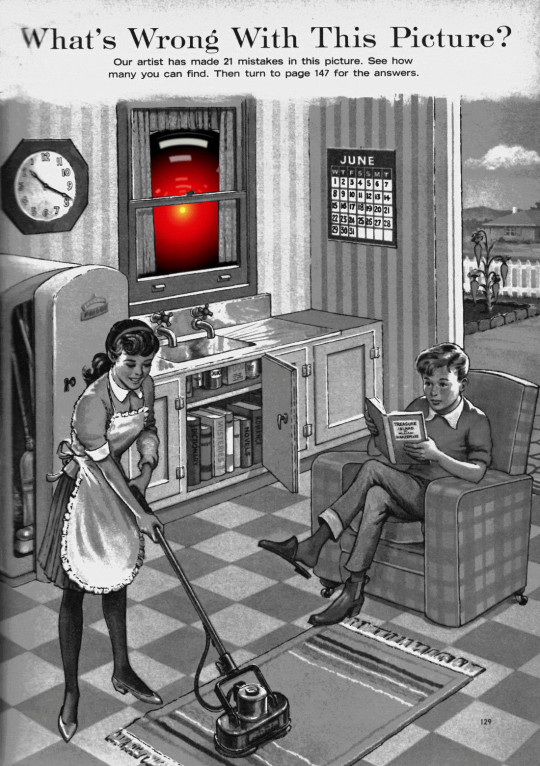
I'm touring my new, nationally bestselling novel The Bezzle! Catch me SATURDAY (Apr 27) in MARIN COUNTY, then Winnipeg (May 2), Calgary (May 3), Vancouver (May 4), and beyond!

If AI has a future (a big if), it will have to be economically viable. An industry can't spend 1,700% more on Nvidia chips than it earns indefinitely – not even with Nvidia being a principle investor in its largest customers:
https://news.ycombinator.com/item?id=39883571
A company that pays 0.36-1 cents/query for electricity and (scarce, fresh) water can't indefinitely give those queries away by the millions to people who are expected to revise those queries dozens of times before eliciting the perfect botshit rendition of "instructions for removing a grilled cheese sandwich from a VCR in the style of the King James Bible":
https://www.semianalysis.com/p/the-inference-cost-of-search-disruption
Eventually, the industry will have to uncover some mix of applications that will cover its operating costs, if only to keep the lights on in the face of investor disillusionment (this isn't optional – investor disillusionment is an inevitable part of every bubble).
Now, there are lots of low-stakes applications for AI that can run just fine on the current AI technology, despite its many – and seemingly inescapable - errors ("hallucinations"). People who use AI to generate illustrations of their D&D characters engaged in epic adventures from their previous gaming session don't care about the odd extra finger. If the chatbot powering a tourist's automatic text-to-translation-to-speech phone tool gets a few words wrong, it's still much better than the alternative of speaking slowly and loudly in your own language while making emphatic hand-gestures.
There are lots of these applications, and many of the people who benefit from them would doubtless pay something for them. The problem – from an AI company's perspective – is that these aren't just low-stakes, they're also low-value. Their users would pay something for them, but not very much.
For AI to keep its servers on through the coming trough of disillusionment, it will have to locate high-value applications, too. Economically speaking, the function of low-value applications is to soak up excess capacity and produce value at the margins after the high-value applications pay the bills. Low-value applications are a side-dish, like the coach seats on an airplane whose total operating expenses are paid by the business class passengers up front. Without the principle income from high-value applications, the servers shut down, and the low-value applications disappear:
https://locusmag.com/2023/12/commentary-cory-doctorow-what-kind-of-bubble-is-ai/
Now, there are lots of high-value applications the AI industry has identified for its products. Broadly speaking, these high-value applications share the same problem: they are all high-stakes, which means they are very sensitive to errors. Mistakes made by apps that produce code, drive cars, or identify cancerous masses on chest X-rays are extremely consequential.
Some businesses may be insensitive to those consequences. Air Canada replaced its human customer service staff with chatbots that just lied to passengers, stealing hundreds of dollars from them in the process. But the process for getting your money back after you are defrauded by Air Canada's chatbot is so onerous that only one passenger has bothered to go through it, spending ten weeks exhausting all of Air Canada's internal review mechanisms before fighting his case for weeks more at the regulator:
https://bc.ctvnews.ca/air-canada-s-chatbot-gave-a-b-c-man-the-wrong-information-now-the-airline-has-to-pay-for-the-mistake-1.6769454
There's never just one ant. If this guy was defrauded by an AC chatbot, so were hundreds or thousands of other fliers. Air Canada doesn't have to pay them back. Air Canada is tacitly asserting that, as the country's flagship carrier and near-monopolist, it is too big to fail and too big to jail, which means it's too big to care.
Air Canada shows that for some business customers, AI doesn't need to be able to do a worker's job in order to be a smart purchase: a chatbot can replace a worker, fail to their worker's job, and still save the company money on balance.
I can't predict whether the world's sociopathic monopolists are numerous and powerful enough to keep the lights on for AI companies through leases for automation systems that let them commit consequence-free free fraud by replacing workers with chatbots that serve as moral crumple-zones for furious customers:
https://www.sciencedirect.com/science/article/abs/pii/S0747563219304029
But even stipulating that this is sufficient, it's intrinsically unstable. Anything that can't go on forever eventually stops, and the mass replacement of humans with high-speed fraud software seems likely to stoke the already blazing furnace of modern antitrust:
https://www.eff.org/de/deeplinks/2021/08/party-its-1979-og-antitrust-back-baby
Of course, the AI companies have their own answer to this conundrum. A high-stakes/high-value customer can still fire workers and replace them with AI – they just need to hire fewer, cheaper workers to supervise the AI and monitor it for "hallucinations." This is called the "human in the loop" solution.
The human in the loop story has some glaring holes. From a worker's perspective, serving as the human in the loop in a scheme that cuts wage bills through AI is a nightmare – the worst possible kind of automation.
Let's pause for a little detour through automation theory here. Automation can augment a worker. We can call this a "centaur" – the worker offloads a repetitive task, or one that requires a high degree of vigilance, or (worst of all) both. They're a human head on a robot body (hence "centaur"). Think of the sensor/vision system in your car that beeps if you activate your turn-signal while a car is in your blind spot. You're in charge, but you're getting a second opinion from the robot.
Likewise, consider an AI tool that double-checks a radiologist's diagnosis of your chest X-ray and suggests a second look when its assessment doesn't match the radiologist's. Again, the human is in charge, but the robot is serving as a backstop and helpmeet, using its inexhaustible robotic vigilance to augment human skill.
That's centaurs. They're the good automation. Then there's the bad automation: the reverse-centaur, when the human is used to augment the robot.
Amazon warehouse pickers stand in one place while robotic shelving units trundle up to them at speed; then, the haptic bracelets shackled around their wrists buzz at them, directing them pick up specific items and move them to a basket, while a third automation system penalizes them for taking toilet breaks or even just walking around and shaking out their limbs to avoid a repetitive strain injury. This is a robotic head using a human body – and destroying it in the process.
An AI-assisted radiologist processes fewer chest X-rays every day, costing their employer more, on top of the cost of the AI. That's not what AI companies are selling. They're offering hospitals the power to create reverse centaurs: radiologist-assisted AIs. That's what "human in the loop" means.
This is a problem for workers, but it's also a problem for their bosses (assuming those bosses actually care about correcting AI hallucinations, rather than providing a figleaf that lets them commit fraud or kill people and shift the blame to an unpunishable AI).
Humans are good at a lot of things, but they're not good at eternal, perfect vigilance. Writing code is hard, but performing code-review (where you check someone else's code for errors) is much harder – and it gets even harder if the code you're reviewing is usually fine, because this requires that you maintain your vigilance for something that only occurs at rare and unpredictable intervals:
https://twitter.com/qntm/status/1773779967521780169
But for a coding shop to make the cost of an AI pencil out, the human in the loop needs to be able to process a lot of AI-generated code. Replacing a human with an AI doesn't produce any savings if you need to hire two more humans to take turns doing close reads of the AI's code.
This is the fatal flaw in robo-taxi schemes. The "human in the loop" who is supposed to keep the murderbot from smashing into other cars, steering into oncoming traffic, or running down pedestrians isn't a driver, they're a driving instructor. This is a much harder job than being a driver, even when the student driver you're monitoring is a human, making human mistakes at human speed. It's even harder when the student driver is a robot, making errors at computer speed:
https://pluralistic.net/2024/04/01/human-in-the-loop/#monkey-in-the-middle
This is why the doomed robo-taxi company Cruise had to deploy 1.5 skilled, high-paid human monitors to oversee each of its murderbots, while traditional taxis operate at a fraction of the cost with a single, precaratized, low-paid human driver:
https://pluralistic.net/2024/01/11/robots-stole-my-jerb/#computer-says-no
The vigilance problem is pretty fatal for the human-in-the-loop gambit, but there's another problem that is, if anything, even more fatal: the kinds of errors that AIs make.
Foundationally, AI is applied statistics. An AI company trains its AI by feeding it a lot of data about the real world. The program processes this data, looking for statistical correlations in that data, and makes a model of the world based on those correlations. A chatbot is a next-word-guessing program, and an AI "art" generator is a next-pixel-guessing program. They're drawing on billions of documents to find the most statistically likely way of finishing a sentence or a line of pixels in a bitmap:
https://dl.acm.org/doi/10.1145/3442188.3445922
This means that AI doesn't just make errors – it makes subtle errors, the kinds of errors that are the hardest for a human in the loop to spot, because they are the most statistically probable ways of being wrong. Sure, we notice the gross errors in AI output, like confidently claiming that a living human is dead:
https://www.tomsguide.com/opinion/according-to-chatgpt-im-dead
But the most common errors that AIs make are the ones we don't notice, because they're perfectly camouflaged as the truth. Think of the recurring AI programming error that inserts a call to a nonexistent library called "huggingface-cli," which is what the library would be called if developers reliably followed naming conventions. But due to a human inconsistency, the real library has a slightly different name. The fact that AIs repeatedly inserted references to the nonexistent library opened up a vulnerability – a security researcher created a (inert) malicious library with that name and tricked numerous companies into compiling it into their code because their human reviewers missed the chatbot's (statistically indistinguishable from the the truth) lie:
https://www.theregister.com/2024/03/28/ai_bots_hallucinate_software_packages/
For a driving instructor or a code reviewer overseeing a human subject, the majority of errors are comparatively easy to spot, because they're the kinds of errors that lead to inconsistent library naming – places where a human behaved erratically or irregularly. But when reality is irregular or erratic, the AI will make errors by presuming that things are statistically normal.
These are the hardest kinds of errors to spot. They couldn't be harder for a human to detect if they were specifically designed to go undetected. The human in the loop isn't just being asked to spot mistakes – they're being actively deceived. The AI isn't merely wrong, it's constructing a subtle "what's wrong with this picture"-style puzzle. Not just one such puzzle, either: millions of them, at speed, which must be solved by the human in the loop, who must remain perfectly vigilant for things that are, by definition, almost totally unnoticeable.
This is a special new torment for reverse centaurs – and a significant problem for AI companies hoping to accumulate and keep enough high-value, high-stakes customers on their books to weather the coming trough of disillusionment.
This is pretty grim, but it gets grimmer. AI companies have argued that they have a third line of business, a way to make money for their customers beyond automation's gifts to their payrolls: they claim that they can perform difficult scientific tasks at superhuman speed, producing billion-dollar insights (new materials, new drugs, new proteins) at unimaginable speed.
However, these claims – credulously amplified by the non-technical press – keep on shattering when they are tested by experts who understand the esoteric domains in which AI is said to have an unbeatable advantage. For example, Google claimed that its Deepmind AI had discovered "millions of new materials," "equivalent to nearly 800 years’ worth of knowledge," constituting "an order-of-magnitude expansion in stable materials known to humanity":
https://deepmind.google/discover/blog/millions-of-new-materials-discovered-with-deep-learning/
It was a hoax. When independent material scientists reviewed representative samples of these "new materials," they concluded that "no new materials have been discovered" and that not one of these materials was "credible, useful and novel":
https://www.404media.co/google-says-it-discovered-millions-of-new-materials-with-ai-human-researchers/
As Brian Merchant writes, AI claims are eerily similar to "smoke and mirrors" – the dazzling reality-distortion field thrown up by 17th century magic lantern technology, which millions of people ascribed wild capabilities to, thanks to the outlandish claims of the technology's promoters:
https://www.bloodinthemachine.com/p/ai-really-is-smoke-and-mirrors
The fact that we have a four-hundred-year-old name for this phenomenon, and yet we're still falling prey to it is frankly a little depressing. And, unlucky for us, it turns out that AI therapybots can't help us with this – rather, they're apt to literally convince us to kill ourselves:
https://www.vice.com/en/article/pkadgm/man-dies-by-suicide-after-talking-with-ai-chatbot-widow-says

If you'd like an essay-formatted version of this post to read or share, here's a link to it on pluralistic.net, my surveillance-free, ad-free, tracker-free blog:
https://pluralistic.net/2024/04/23/maximal-plausibility/#reverse-centaurs

Image:
Cryteria (modified)
https://commons.wikimedia.org/wiki/File:HAL9000.svg
CC BY 3.0
https://creativecommons.org/licenses/by/3.0/deed.en
#pluralistic#ai#automation#humans in the loop#centaurs#reverse centaurs#labor#ai safety#sanity checks#spot the mistake#code review#driving instructor
691 notes
·
View notes
Text
Apple Seed 13: Telling the Hotel
Angel: (Opens his bedroom door at all the commotion)
Lucifer: (rushes by) Fuck. Fuck. Fuck. Fuck.
Angel: ........
Lucifer: (rushes by again going the opposite direction and carrying a large laundry basket full of towels and sheets) Fuck. Fuck. Fuck. Fuck.
Angel: ...........
Lucifer: (runs by again) Fuck. Fuck. Fuck. Fuck.
Angel: Uh.... What's up, Short King?
Lucifer: (running back through with another basket filled with miscellaneous items) Charlie's having the baby!!! (Continues running) Fuck. Fuck. Fuck. Fuck.
Angel: Oh......... (eyes snap open to his hair line) OH, FUCK!!!!
Husk: (opens his bedroom door) What the fuck is going on?
Angel: (throws on his fluffy robe and follows Lucifer with an arm full of comfy things) Fuck. Fuck. Fuck. Fuck.
Husk: .......
Niffty: (strutting along the hallway with a pot of hot water) Charlie's having the baby.
Husk: Oh..... (eyes bulge out of his head, and he slips his suspenders up over his shoulders before running down the hall) Fuck. Fuck. Fuck. Fuck.
Lilith: (enters the hotel in the middle of the night and sees Lucifer sprinting down the stairs) Ah, Lucifer. I should have known you'd be the first one to greet me.
Lucifer: (completely ignores Lilith as he runs to the kitchen for supplies) Fuck. Fuck. Fuck. Fuck.
Lilith: .........
Lucifer: (runs by again with a dozen watter bottles and some crackers) Fuck. Fuck. Fuck. Fuck.
Lilith: .............Am I missing something?
Alastor: Charlie's in labor.
Lilith: Oh....... (shattering glass audio) WHAT?!?!?! SHE ACTUALLY MARRIED THAT VON ELDRITCH TWERP?!?!?! (Sprints up the stairs, riding on Lucifer's heels) Fuck. Fuck. Fuck. Fuck.
Charlie: (waddling around her and Vaggie's room and focusing on her breathing) Ohhhhhhhhh..... Oh, fuck..... *pant pant* Oh, shit! (Doubles over in pain and clenches Vaggie's hand so hard it breaks two bones as a contraction hits)
Vaggie: (completely immune to the pain thanks to the adrenaline pumping through her system as she rubs Charlie's back) You're doing great, mi amor. Absolutely fantastic. Breathe with me. In (slowly breathes in) and out (breathes out steadily).
Charlie: (nods and shakily follows the instruction) How's, ah!, how's my dad taking the news?
Vaggie: Let me check. (Kisses Charlie's hand tenderly before quickly looking out the bedroom door and seeing Angel, Husk, Lucifer, and Lilith running around like maniacs and Alastor and Niffty sauntering around like thing's going on) Uh..... everyone's taking things... well?
#apple seed au#part 13#apple seed#pregnant charlie#labor#chaggie#charlie#vaggie#alastor#angel#husk#niffty#lucifer#lilith
197 notes
·
View notes
Text
You can’t unionize autoworkers in the South, they said.
Well, whoever “they” are, they were wrong. Because, on Friday, 73 percent of Volkswagen workers in Chattanooga, Tennessee, voted to become the first non-union auto plant to unionize in decades, and the first foreign-owned auto plant to unionize in the South, period.
This happened despite a union-busting campaign so fierce that even governors in the South got on board, sending out a letter last week warning workers not to organize, telling them that “The experience in our states is when employees have a direct relationship with their employers, that makes for a more positive working environment.”
Clearly, the employees didn’t think so.
Via UAW:
“This election is big,” said Kelcey Smith, a worker in the paint department at Volkswagen. “People in high places told us good things can’t happen here in Chattanooga. They told us this isn’t the time to stand up, this isn’t the place. But we did stand up and we won. This is the time; this is the place. Southern workers are ready to stand up and win a better life.”
“We saw the big contract that UAW workers won at the Big Three and that got everybody talking,” said Zachary Costello, a trainer in VW’s proficiency room. “You see the pay, the benefits, the rights UAW members have on the job, and you see how that would change your life. That’s why we voted overwhelmingly for the union. Once people see the difference a union makes, there’s no way to stop them.”
“This is a movement for every blue-collar worker in America,” said Doug Snyder, a body worker at Volkswagen. “Our vote shows that workers everywhere want a better life on and off the job. Fair pay is important, but so is time with our families. So is a voice for safety in our plant. We’re looking forward to getting to the bargaining table with the company and winning a contract that makes things right at Volkswagen.”
146 notes
·
View notes
Text
Job interview tip I got from a tiktok but it's genius:
If you were unemployed for a while, they're going to ask if you can explain the gap in your resume. Unless you were actually doing something cool & relevant, this is hard to answer in a way that makes you sound like a good corporate cog. So here's the best and infallible answer -
No you cannot, because you signed an NDA.
You now sound mysterious, desirable, worldly, experienced. They can't even really ask you more about it! Perfect.
#obviously it is morally correct to lie on job applications/at interviews#level that playing field any way you can#employment#labor#job interview tips
45K notes
·
View notes
Text
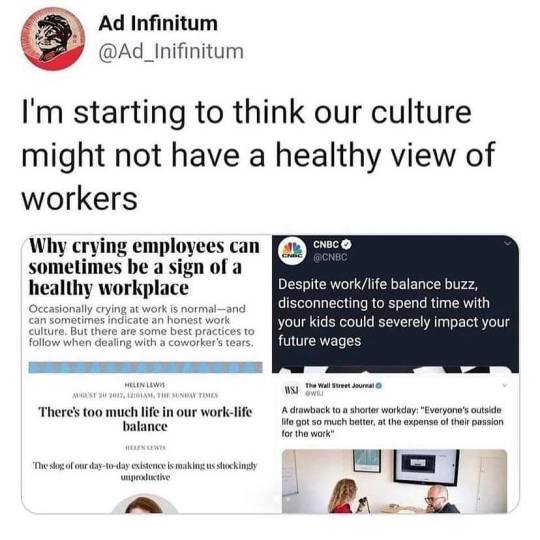
36K notes
·
View notes
Text
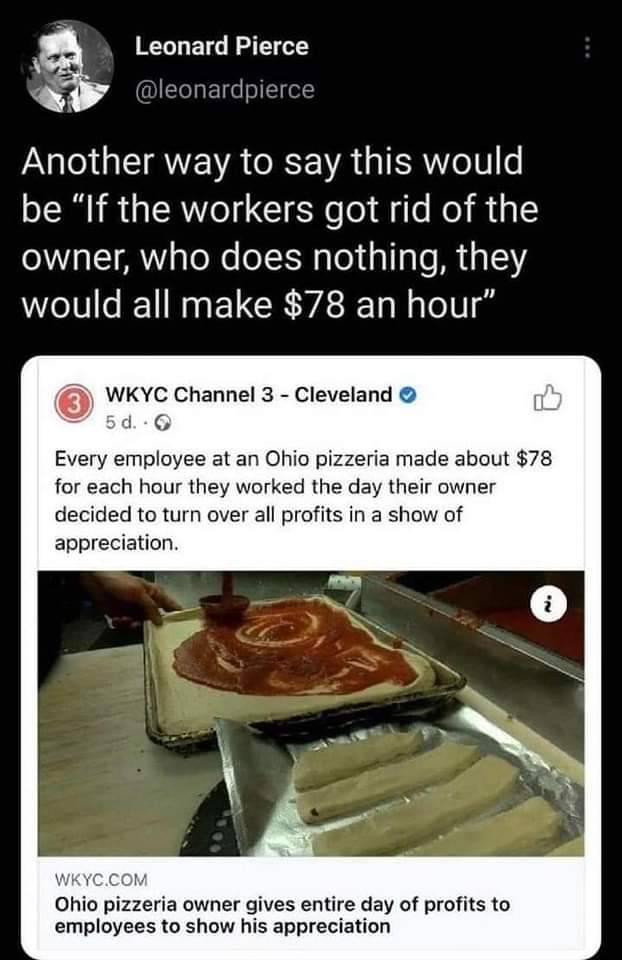
Stuff like this radicalizes me. How is this the best system we have?
67K notes
·
View notes
Text


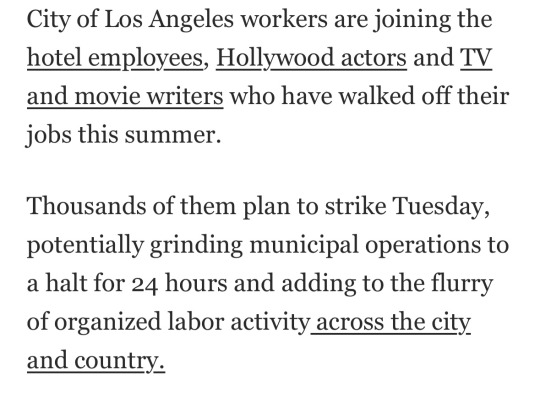
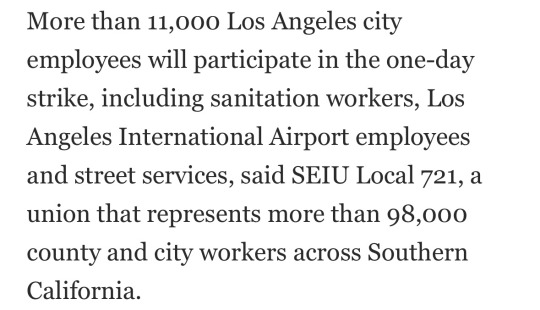
Source
Let’s go
#unions#unionize#labor#workers#workers rights#solidarity#capitalism#California#government#the left#progressive#current events#news
19K notes
·
View notes
Photo

#tweet#tweets#twitter#pixar#workers rights#workers vs capital#workers#labor vs capital#labor rights#labor#capitalism is a scam#toy story#toy story 2
33K notes
·
View notes
Photo

41K notes
·
View notes
Note
Hi- er, this is my first-ever writer's strike, how does one not cross a picket line in this context? I know how not to do it with things like Amazon and IRL strikes, but how does it apply to media/streaming?
Hi, this is a great question, because it allows me to write about the difference between honoring a picket line and a boycott. (This is reminding me of the labor history podcast project that's lain fallow in my drafts folder for some time now...) In its simplest formulation, the difference between a picket line and a boycott is that a picket line targets an employer at the point of production (which involves us as workers), whereas a boycott targets an employer at the point of consumption (which involves us as consumers).
So in the case of the WGA strike, this means that at any company that is being struck by the WGA - I've seen Netflix, Amazon, Apple, Disney, Warner Brothers Discovery, NBC, Paramount, and Sony mentioned, but there may be more (check the WGA website and social media for a comprehensive list) - you do not cross a picket line, whether physical or virtual. This means you do not take a meeting with them, even if its a pre-existing project, you do not take phone calls or texts or emails or Slacks from their executives, you do not pitch them on a spec script you've written, and most of all you do not answer any job application.
Because if this strike is like any strike since the dawn of time, you will see the employers put out ads for short-term contracts that will be very lucrative, generally above union scale - because what they're paying for in addition to your labor is you breaking the picket line and damaging the strike - to anyone willing to scab against their fellow workers. GIven that one of the main issues of the WGA are the proliferation of short-term "mini rooms" whereby employers are hiring teams of writers to work overtime for a very short period, to the point where they can only really do the basics (a series outline, some "broken stories," and some scripts) and then have the showrunner redo everything on their lonesome, while not paying writers long-term pay and benefits, I would imagine we're going to see a lot of scab contracts being offered for these mini rooms.
But for most of us, unless we're actively working as writers in Hollywood, most of that isn't going to be particularly relevant to our day-to-day working lives. If you're not a professional or aspiring Hollywood writer, the important thing to remember honoring the picket line doesn't mean the same thing as a boycott. WGA West hasn't called on anyone to stop going to the movies or watching tv/streaming or to cancel their streaming subscriptions or anything like that. If and when that happens, WGA will go to some lengths to publicize that ask - and you should absolutely honor it if you can - so there will be little in the way of ambiguity as to what's going on.
That being said, one of the things that has happened in the past in other strikes is that well-intentioned people get it into their heads to essentially declare wildcat (i.e, unofficial and unsanctioned) boycotts. This kind of stuff comes from a good place, someone wanting to do more to support the cause and wanting to avoid morally contaminating themselves by associating with a struck company, but it can have negative effects on the workers and their unions. Wildcat boycotts can harm workers by reducing back-end pay and benefits they get from shows if that stuff is tied to the show's performance, and wildcat boycotts can hurt unions by damaging negotiations with employers that may or may not be going on.
The important thing to remember with all of this is that the strike is about them, not us. Part of being a good ally is remembering to let the workers' voices be heard first and prioritizing being a good listener and following their lead, rather than prioritizing our feelings.
28K notes
·
View notes
Text
Apple Seed 14: Almost There
13 Hours Into Labor
Charlie: (breathing heavily) Oh, sshhhhhhhhit!!! Contractions are getting worse! Where's that midwife????
Vaggie: She's on her way, babe. (under her breath) Or at least she better be. Your dad was supposed to call her hours ago.
Charlie: (groans into a cry of pain as another contraction hits and she crushes Vaggie's hand) Gah! Fuck! Fuck, fuck, fuck!!!
Vaggie: Hang on, babe. Just hang on. I'm going to be right back.
Charlie: (nods as sweat beads up on her head) Please, hurry back.
Vaggie: I'll be back before you know it. (kisses Charlie's hand and rushes to the door before nearly ripping it off its hinges) Lucifer! Where the fuck is that midwife?!
Lucifer: (eyes nearly pop out of his head) I FORGOT TO CALL SLOTH!!!
Vaggie: ¡Estúpido hijo de puta! You had one fucking job!
Lucifer: (fumbles his phone) I got it! I can fix this!
Lilith: (storms up to Vaggie, trying to get into the room)
Vaggie: (blocks the door) Uh, excuse you? Who the fuck do you think you are?
Lilith: I am that girl's mother. Who are you?
Vaggie: I'm her fucking WIFE, bitch! You're not going in there after being gone for several fucking years! You can wait out here!
Lilith: (shocked Pikachu face)
Lucifer: I made a call! She'll be here in a few minutes!
Vaggie: Good! Alastor, do something productive and get a container of cold water to help cool Charlie down!
-Hotel Door Practically Explodes Open-
Vaggie: What the fuck?! (looks over the railing) CARMINE?!?!
Carmilla: (struts in and up the stairs) Stop shouting, girl. Why are you surprised? Your father-in-law called me.
Vaggie: (glares at Lucifer)
Lucifer: (checks his call history) Oh.... I did.... shit..... I thought that was Sloth.... I'm TIRED, okay?!?!
Rosie: (tip-taps in) Hello, everyone!
Vaggie: ROSIE!!!!! Lucifer! Did you call her, too?!?!
Alastor: (holding a bucket of water) No, that was me. (tries to go into the room)
Lucifer: WHOA!!!! (blocks the door) What the FUCK do you think you're doing?
Alastor: I'm bringing Charlie her cold water. I think if anyone should be going into a blood bath, the prior serial killer overlord and father figure should be the one to do it.
Lucifer: YOU aren't going ANYWHERE near MY baby girl when she's at her most vulnerable!!!
Alastor: Hmmm.... (shadow phases along the floor and into the room)
Lucifer: SON OF A BITCH!!!!
Alastor: Charlie, dear! I've brought you some co- (sees Charlie laying on top of a mound of linens and towels with her legs hiked up, knees bent, and her lower half on full, bloody display)
Charlie: (panting, looks to the door, and her demonic features spring to attention) ALASTOR?!?!?! GET THE FUCK OUT!!!
Alastor: (faints and falls backwards out the door)
Lucifer: HA!!! TAKE THAT, ASSHOLE!!!
Rosie: Oh, my stars! Alastor! (drags Alastor out of the room and sets him up to recover on the floor, fanning his face with a kerchief) Alastor, Alastor, wake up. Deep breaths, dear.
Angel: Ha! Smiles is so pussy averted that even when he spots one in labor he can't stomach it.
Carmilla: ....... (steps over Alastor's body and walks calmly to the bedroom) How far apart are the Princess's contractions?
Vaggie: They're coming about every five or six minutes and last about fifty seconds each. (follows Carmilla into the room) Do we need to worry about pushing yet?
Charlie: (gets wracked with another contraction and growls demonically into an ear splitting shriek) VAAGGGGIIIIIEEEE!!!!!
Carmilla: I believe that should answer your question.
#hazbin hotel#Apple Seed#part 14#apple seed au#pregnant charlie#labor#chaggie#charlie#vaggie#alastor#lucifer#lilith#carmilla#angel dust#rosie#we're almost there!#Alastor is VERY AroAce#chaos ensues#demon charlie#all the moms are here
108 notes
·
View notes
Text

(Nov. 7)
@MorePerfectUS: Bangladesh is raising the minimum wage for garment workers by 56% after workers led mass protests. Weeks of strikes had shut down factories for brands like Gap, H&M, and Zara. Worker groups plan to keep protesting, saying the new $113/month wage falls far short of fair pay.
10K notes
·
View notes
Text
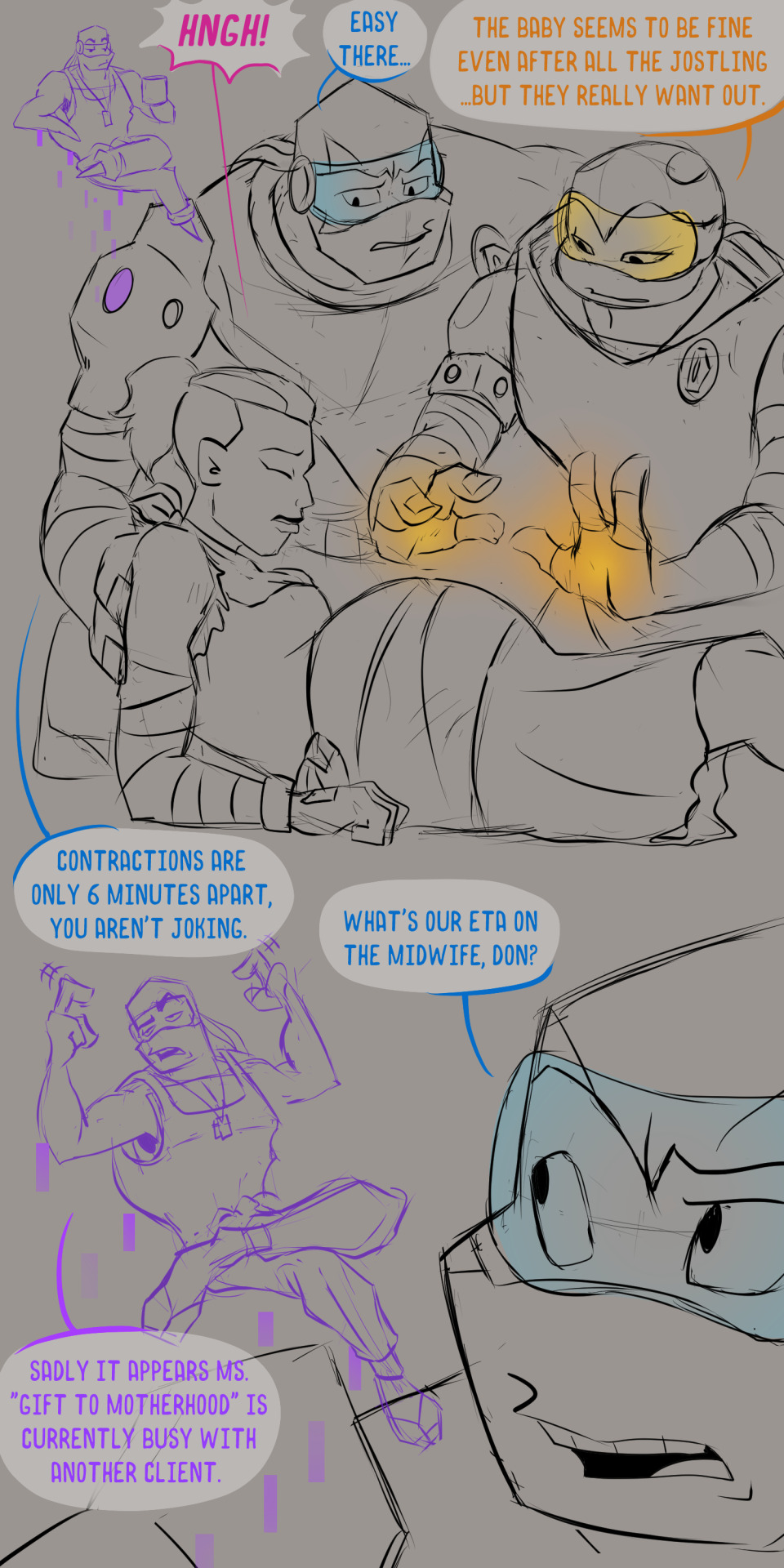
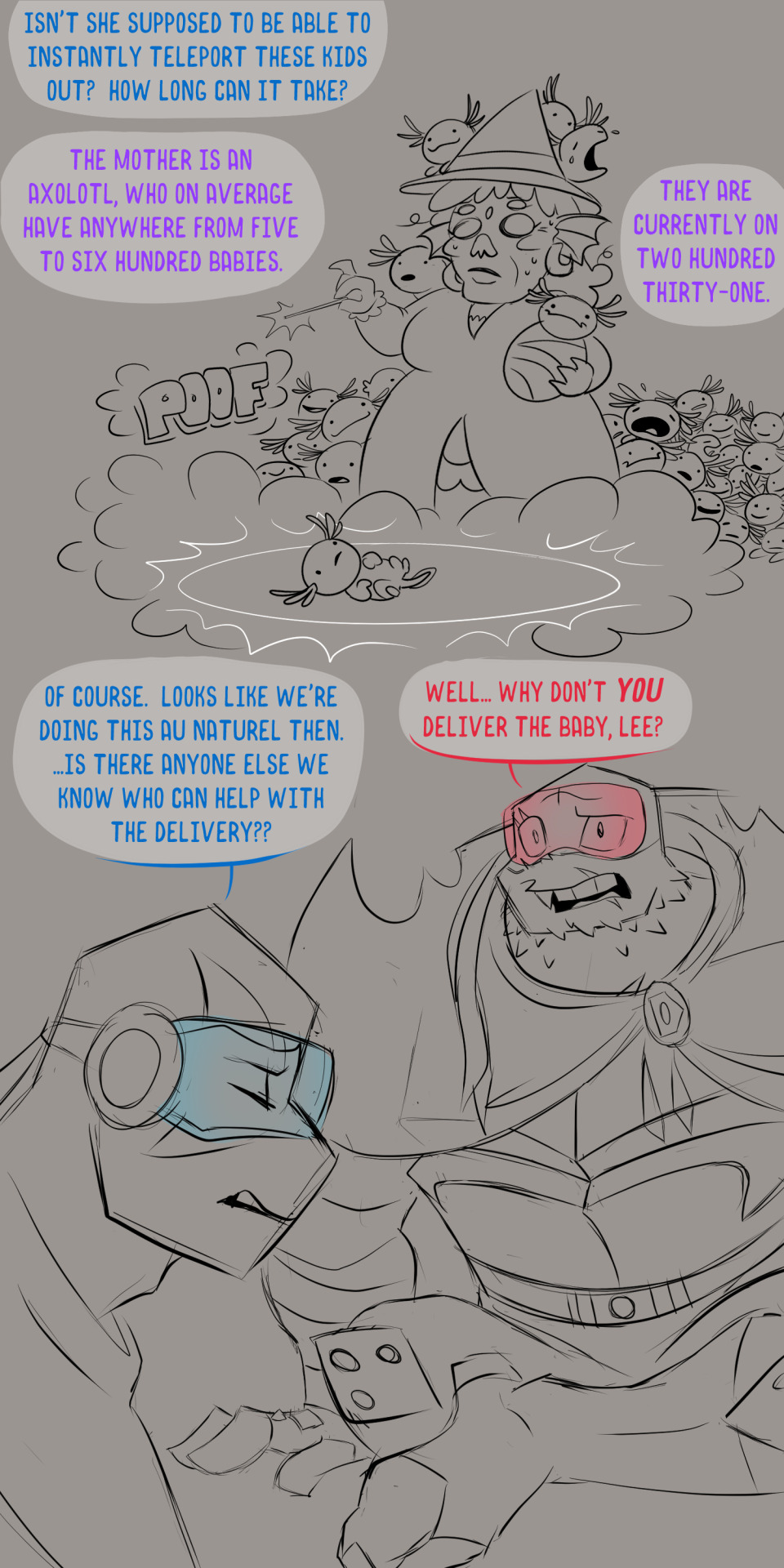
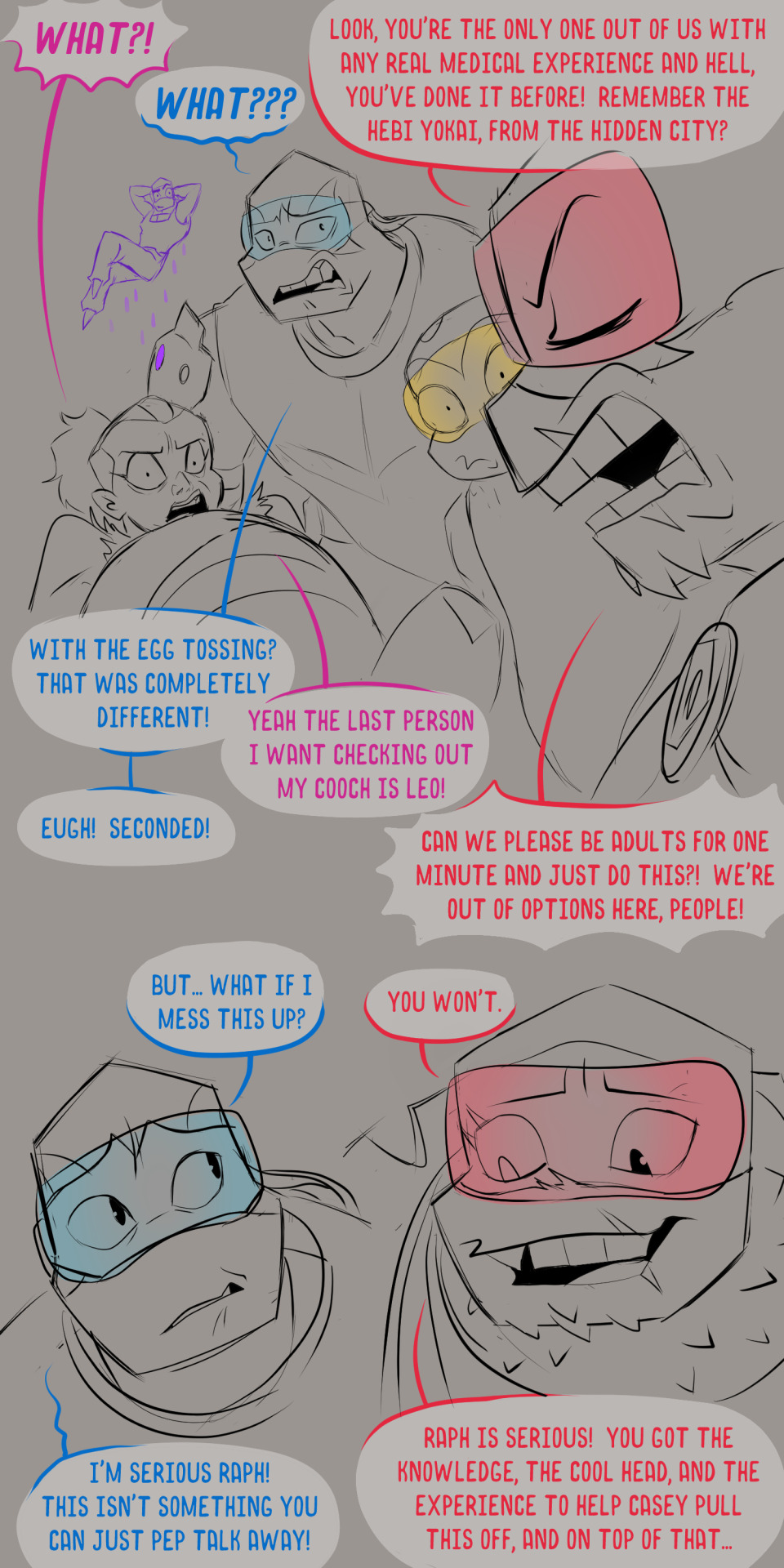
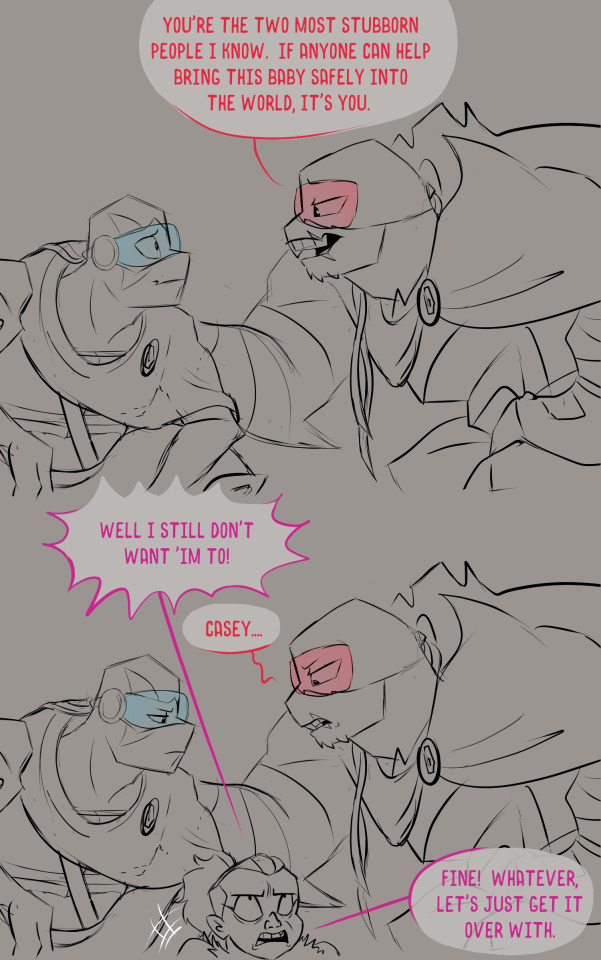
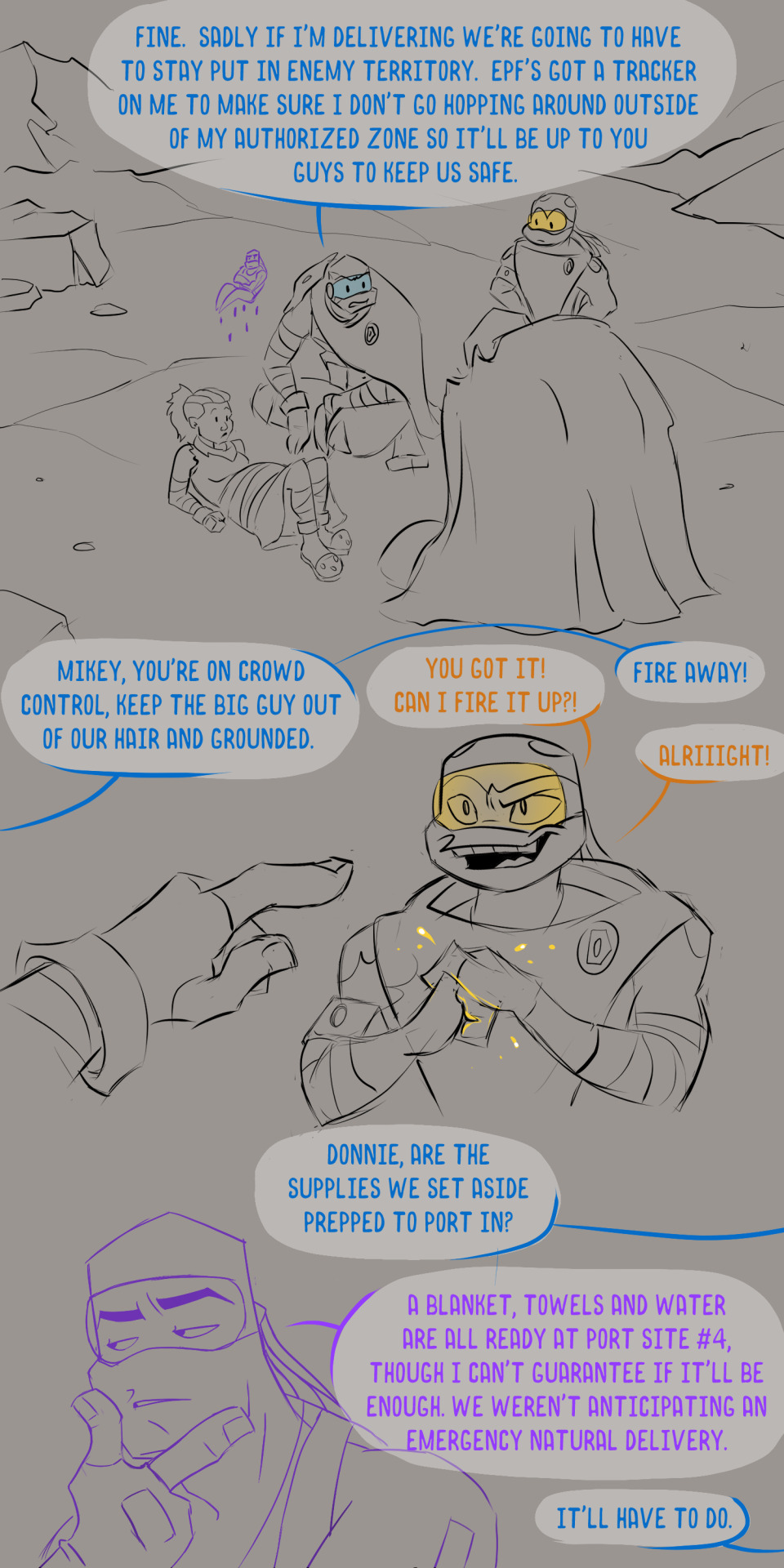
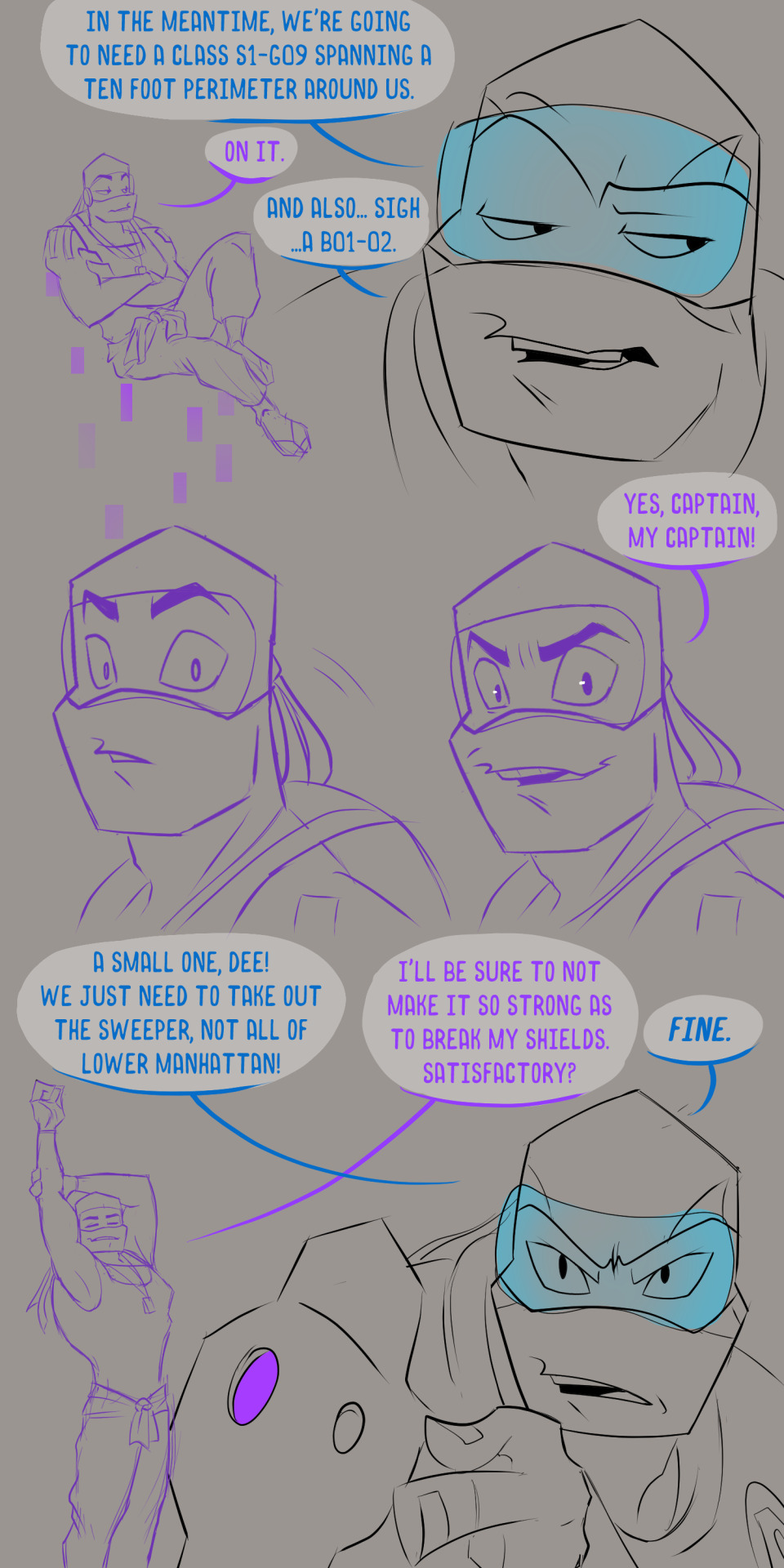
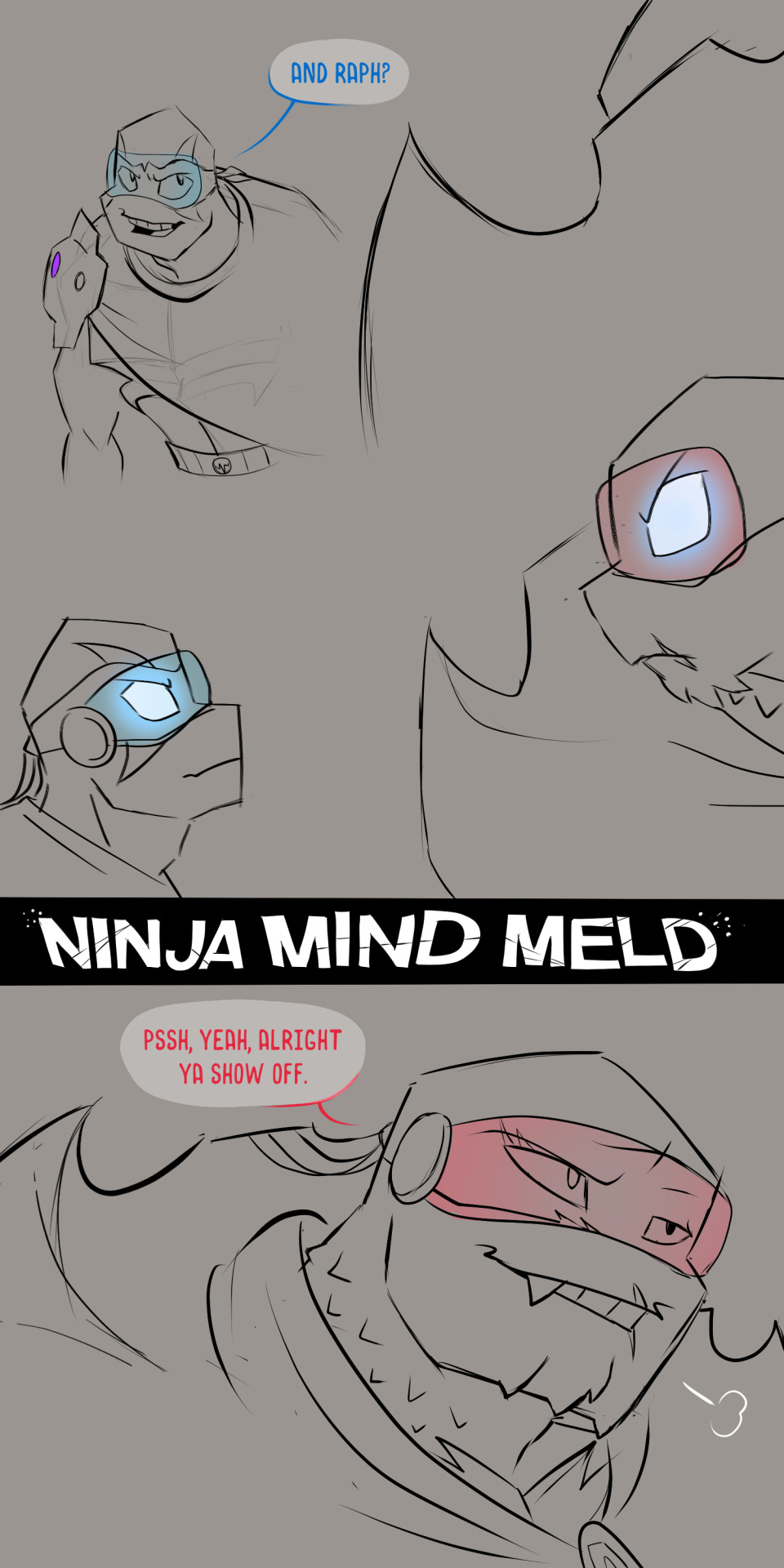
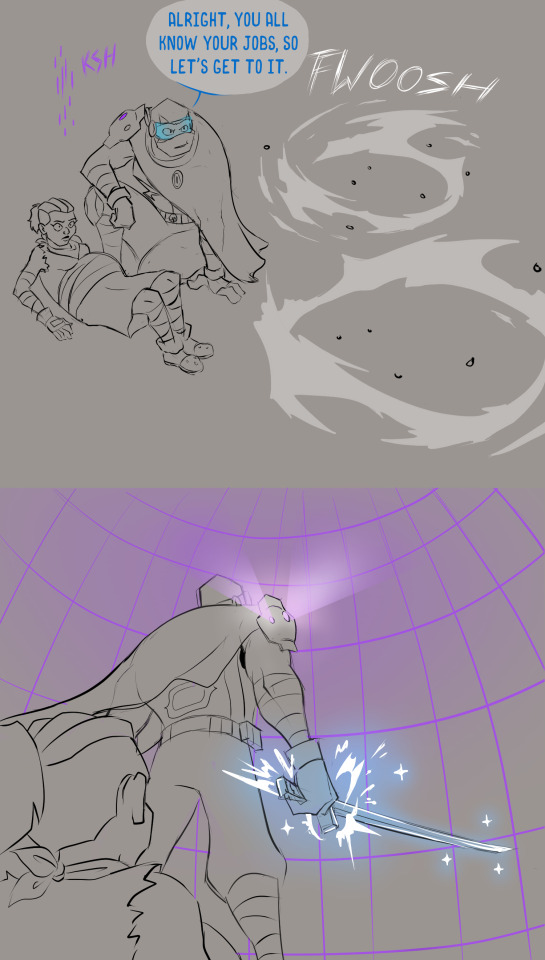
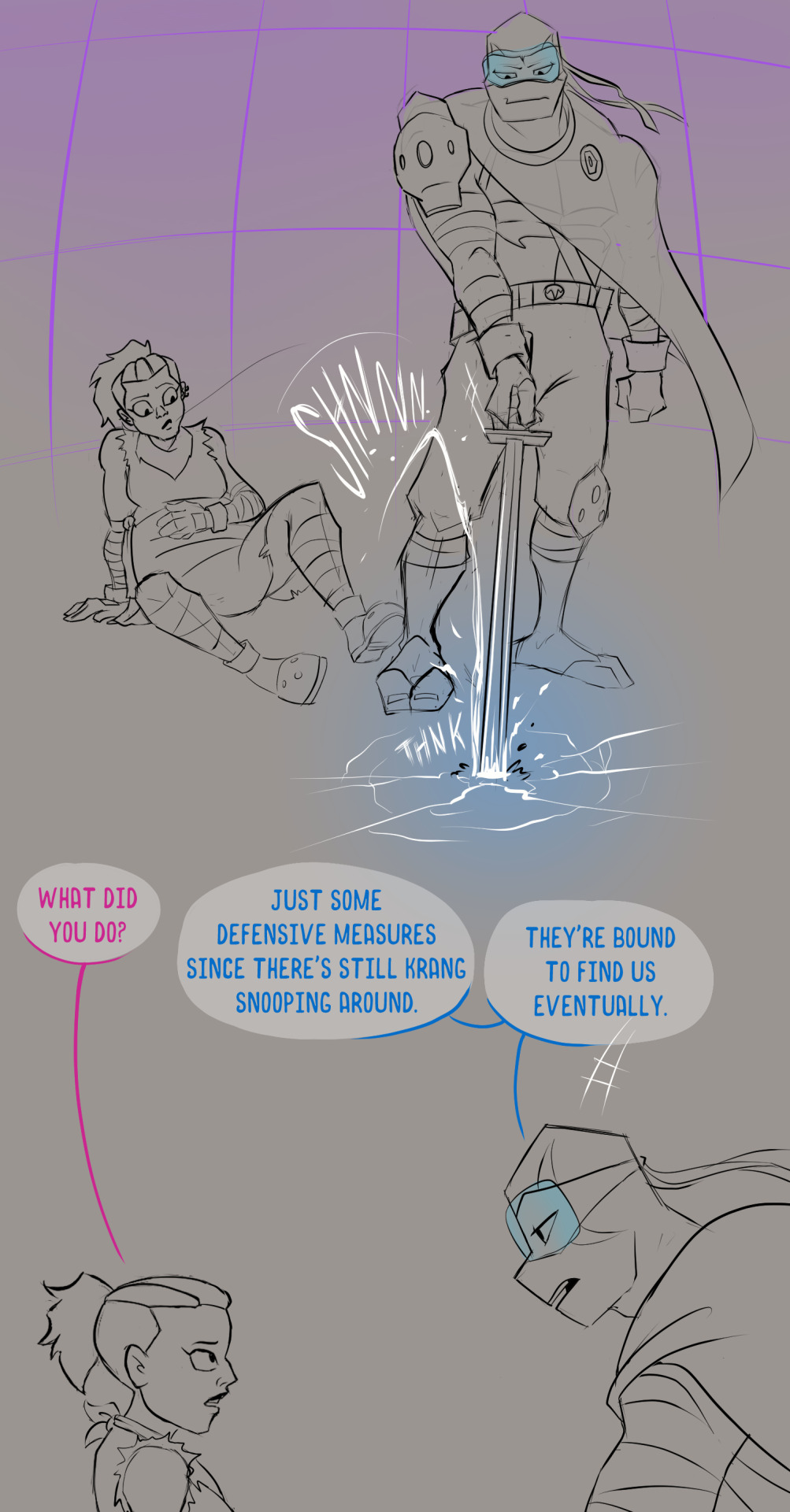
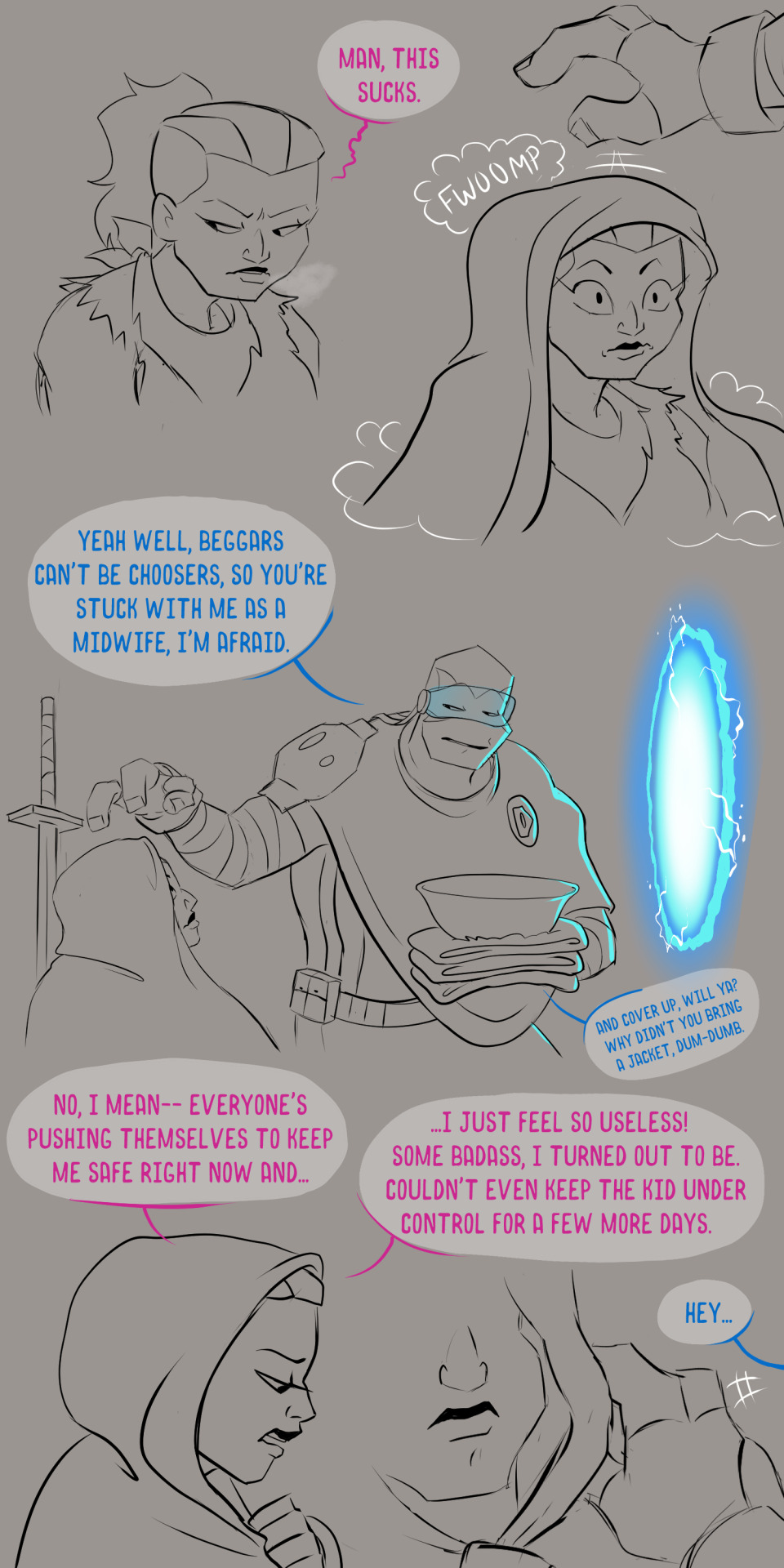
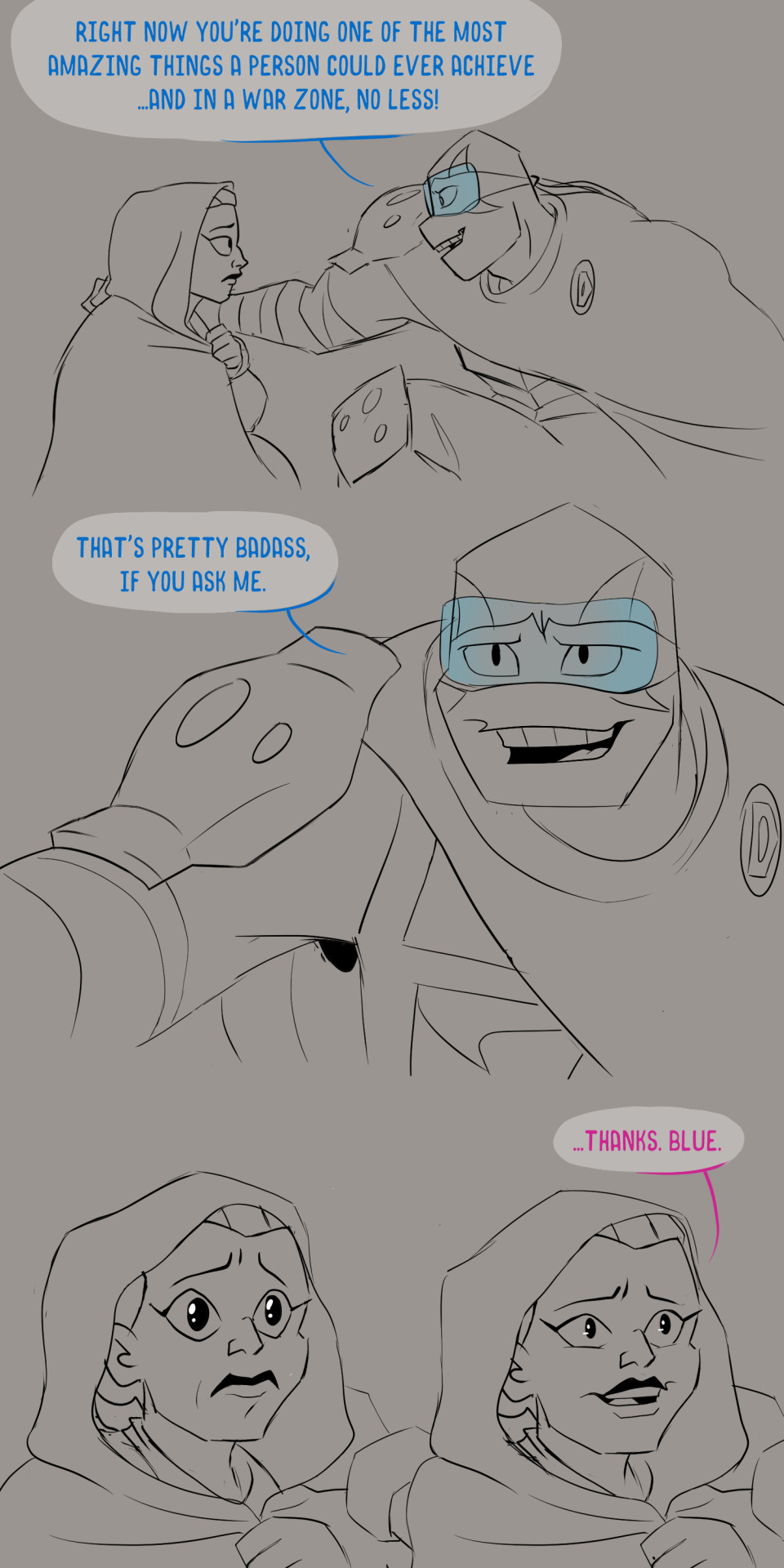
The eye of the hurricane. I like to think Cassandra sometimes called the brothers by the nicknames their dad used, given they were probably pretty close before his passing.
BEGINNING || PREVIOUS || NEXT (SOON)
MASTER POST
Man oh man, this one was way messier and off model than my last few updates but whatever, we got to keep this ball rolling! Life's been crazy so I've had to take some unwanted breaks in between updates. Thanks everyone for your patience as always!
One thing I wanted in this flashback was to really get a sense of how the brothers worked as an experienced team with Leo at the helm as a proper leader. It's something we never got to see much of in Rise and I felt it was important to include since half the team is already gone by the time of Replica. Team Dynamics Ted Talk under the cut!
We know from Casey Jr that Leo stressed the importance of listening to your team. A big part of that also means knowing how to communicate with them in general.
With Michelangelo, he keeps it short and succinct, trusting his brother to know what he's doing when in his element. This trust goes a long way with Mikey, having spent years of his youth as the baby striving for the respect he felt he deserved. Leo knows it's best to not bog Mikey down with details, allowing him to improvise as needed. This unspoken freedom has only grown over time as Mikey has dipped deeper into spiritual arts that, frankly, go completely over Leo's head.
The greatest sacrifice Leo has ever made was read Donnie's Big Book of Bad Guy Codes. While he doesn't remember ALL the numbers, he has memorized the ones that matter and it has helped tremendously in avoiding miscommunication with his genius brother. More importantly it silenced any of Donnie's usual belly-aching. As Leo's "twin"/"equal" the two still butt heads from time to time. Donnie respects his brother's authority (mostly) but will still push the boundaries of what he's allowed on a semi-regular basis. Give Donnie an inch and he will take the mile and then find a loop hole that allows him to go twenty miles more. This is partially due to him often being the one left behind at HQ, making the turtle just a TAD stir crazy. Leo does his best to keep him in line regardless.
Big brother Raph will forever and always be big brother to Leo. As such he holds a place of authority in Leo's heart and is someone he still regularly seeks counsel from in both the ways of leadership and more. Raph is always happy to support his younger brother and does a surprisingly good job (albeit after years of practice) of walking the line so as not to step on his brother's toes in the process. At least not since the secret of "the Key" blew up in their faces several years ago. They don't talk about that anymore. Leo is the leader now and he's done a great job in recent years as far as Raph is concerned. He trusts him to make the right call. The two have a close bond and regularly use mind meld to quickly communicate rather than speak ...this will be important to remember for the future.
Hope that overall feeling came through for this group!
#rottmnt replica#replica#rottmnt#save rottmnt#rise of the teenage mutant ninja turtles#kathaynesart#unpause rottmnt#pregnancy#labor pain#labor#birthing#tmnt#rise of the tmnt#rise leo#rise mikey#rise donnie#rise raph#profanity#is cooch profanity?#I don't know I just found it funny
4K notes
·
View notes
Text
Amazon's bestselling "bitter lemon" energy drink was bottled delivery driver piss
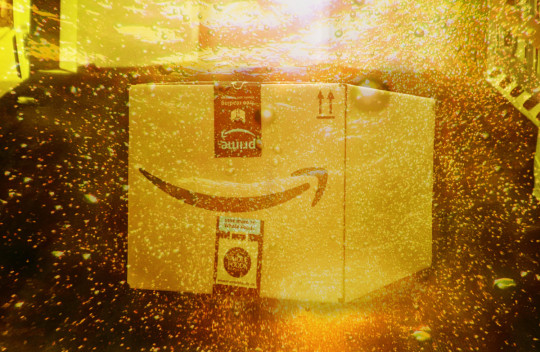
Today (Oct 20), I'm in Charleston, WV at Charleston's Taylor Books from 12h-14h.

For a brief time this year, the bestselling "bitter lemon drink" on Amazon was "Release Energy," which consisted of the harvested urine of Amazon delivery drivers, rebottled for sale by Catfish UK prankster Oobah Butler in a stunt for a new Channel 4 doc, "The Great Amazon Heist":
https://www.channel4.com/programmes/the-great-amazon-heist
Collecting driver piss is surprisingly easy. Amazon, you see, puts its drivers on a quota that makes it impossible for them to drive safely, park conscientiously, or, indeed, fulfill their basic human biological needs. Amazon has long waged war on its employees' kidneys, marking down warehouse workers for "time off task" when they visit the toilets.
As tales of drivers pissing – and shitting! – in their vans multiplied, Amazon took decisive action. The company enacted a strict zero tolerance policy for drivers returning to the depot with bottles of piss in their vans.
That's where Butler comes in: the roads leading to Amazon delivery depots are lined with bottles of piss thrown out of delivery vans by drivers who don't want to lose their jobs, which made harvesting the raw material for "Release Energy" a straightforward matter.
Butler was worried that he wouldn't be able to list his product on Amazon because he didn't have the requisite "food and drinks licensing" certificates, so he listed his drink in Amazon's refillable pump dispenser category. But Amazon's systems detected the mismatch and automatically shifted the product into the drinks section.
Butler enlisted some confederates to place orders for his drink, and it quickly rocketed to the top of Amazon's listings for the category, which led to Amazon's recommendation engine pushing the item on people who weren't in on the gag. When these orders came in, Butler pulled the plug, but not before an Amazon rep telephoned him to pitch him turning packaging, shipping and fulfillment over to Amazon:
https://www.wired.com/story/amazon-let-its-drivers-urine-be-sold-as-an-energy-drink/
The Release Energy prank was just one stunt Butler pulled for his doc; he also went undercover at an Amazon warehouse, during a period when Amazon hired an extra 1,000 workers for its warehouses in Coventry, UK, in a successful bid to dilute pro-union sentiment in his workforce in advance of a key union vote:
https://jacobin.com/2023/10/the-great-amazon-heist-oobah-butler-review
Butler's stint as an Amazon warehouse worker only lasted a couple of days, ending when Amazon recognized him and fired him.
The contrast between Amazon's ability to detect an undercover reporter and its inability to spot bottles of piss being marketed as bitter lemon energy drink says it all, really. Corporations like Amazon hire vast armies of "threat intelligence" creeps who LARP at being CIA superspies, subjecting employees and activists to intense and often illegal surveillance.
But while Amazon's defensive might is laser-focused on the threat of labor organizers and documentarians, the company can't figure out that one of its bestselling products is bottles of its tormented drivers' own urine.
In the USA, the FTC is suing Amazon for its monopolistic tactics, arguing that the company has found ways to raise prices and reduce quality by trapping manufacturers and sellers with its logistics operation, taking $0.45-$0.51 out of every dollar they earn and forcing them to raise prices at all retailers:
https://pluralistic.net/2023/04/25/greedflation/#commissar-bezos
The Release Energy stunt shows where Amazon's priorities are. Not only did Release Energy get listed on Amazon without any quality checks, the company actually nudged it into a category where it was more likely to be consumed by a person. The only notice the company took of Release Energy was in its logistics and manufacturing department – the part of the business that extracts the monopoly rents at issue in the FTC case – which tracked Butler down in order to sell him these services.
The drivers whose piss Butler collected don't work directly for Amazon, they work for a Delivery Service Partner. These DSPs are victims of a pyramid scheme that Amazon set up. DSP operators lease vans and pay to have them skinned in Amazon livery and studded with Amazon sensors. They take out long-term leases on depots, and hire drivers who dress in Amazon uniforms. Their drivers are minutely monitored by Amazon, down to the movements of their eyeballs.
But none of this is "Amazon" – it's all run by an "entrepreneur," whom Amazon can cut loose without notice, leaving them with unfairly terminated employees, outstanding workers' comp claims, a fleet of Amazon-skinned vehicles and unbreakable facilities leases:
https://pluralistic.net/2022/04/17/revenge-of-the-chickenized-reverse-centaurs/
Speaking to Wired, Amazon denied that it forces its drivers to piss in bottles, but Butler clearly catches a DSP dispatcher telling drivers "If you pee in a bottle and leave it [in the vehicle], you will get a point for that" – that is, the part you get punished for isn't the peeing, it's the leaving.
Amazon's defense against the FTC is that it spares no effort to keep its marketplace safe. As Amazon spokesperson James Drummond says, they use "industry-leading tools to prevent genuinely unsafe products being listed." But the only industry-leading tools in evidence are tools to bust unions and screw suppliers.
In her landmark Yale Law Review paper, "Amazon's Antitrust Paradox," FTC Chair Lina Khan makes a brilliant argument that Amazon's alleged benefits to "consumers" are temporary at best, illusory at worst:
https://www.yalelawjournal.org/note/amazons-antitrust-paradox
In Butler's documentary, Khan's hypothesis is thoroughly validated: here's a company extracting hundreds of billions from merchants who raise prices to compensate, and those monopoly rents are "invested" in union-busting and countermeasures against investigative journalists, while the tools to keep you from accidentally getting a bottle of piss in the mail are laughably primitive.
Truly, Amazon is the apex predator of the platform era:
https://pluralistic.net/ApexPredator

If you'd like an essay-formatted version of this post to read or share, here's a link to it on pluralistic.net, my surveillance-free, ad-free, tracker-free blog:
https://pluralistic.net/2023/10/20/release-energy/#the-bitterest-lemon

My next novel is The Lost Cause, a hopeful novel of the climate emergency. Amazon won't sell the audiobook, so I made my own and I'm pre-selling it on Kickstarter!
#pluralistic#release energy#channel 4#amazon#corporate intelligence#labor#unions#amazon labor union#the great Amazon heist#catfish uk#oobah butler#delivery service partner
7K notes
·
View notes
Text
For the record I feel like saying "Dreadwolf is going to suck because they laid off Mary Kirby" is like... really dramatically missing the point of what's going on here.
The next game has been in alpha for nearly a year now. Kirby's work on the game as a writer was probably mostly finished. Which does not make this better. If anything, it makes it worse.
The layoffs aren't terrible news because a game we're looking forward to might be worse because of them. They're terrible news because people who have devoted years of blood, sweat, and tears to making the game good (including the person who wrote one of the two characters on which they've been hanging the entire marketing campaign for said game thus far) have been axed now that the company has decided it can probably get by without them.
The quality of the game when it finally comes out is irrelevant here. If it's amazing, it won't make this any better, and if it's awful, it won't make it any worse. What matters is the people whose labor made it exist at all are profoundly undervalued, the industry as a whole is broken and frankly abusive, and I wish everyone in it some good labor organizing.
7K notes
·
View notes

